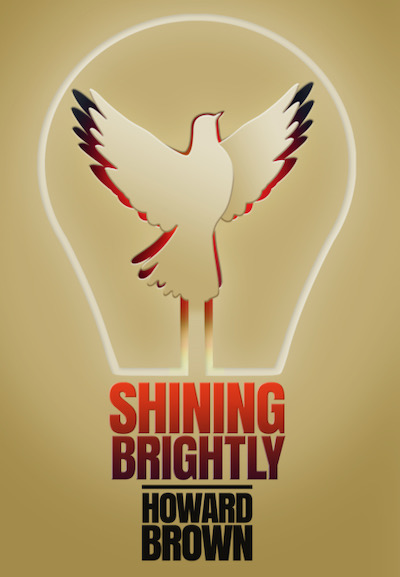
“Whose name shall be inscribed in the book of life?” Ultimate questions are raised each year during the Jewish High Holy Days. On both Rosh Hashanah and Yom Kippur, congregations include the centuries-old prayer that begins “Let us now speak of the awesomeness“—a prayer that echoes many passages of the Hebrew scriptures from Genesis to Psalms. That powerful prayer emphasizes these life-and-death questions. The questions are so central to Judaism that this stained glass window (above) is dedicated to this prayer in the Renanim Synagogue, which now is part of the Heichal Shlomo complex in Judaism. Parts of this 18th-century Italian synagogue were painstakingly shipped to Jerusalem and reconstructed there. Today, Heichal Shlomo is a frequent destination for international visitors to Israel.
.
In 2022, the whole world asks these questions
.
By HOWARD BROWN
Contributing columnist and author of Shining Brightly
When you’re healthy, you may not think twice about a question like: “Who shall live and who shall die?”
For Jews, this is a central question of the High Holy Days: a small yet powerful handful of words among the hundreds of traditional words we pray, chant and contemplate between Rosh Hashanah, the Jewish New Year, and Yom Kippur, the Day of Atonement.
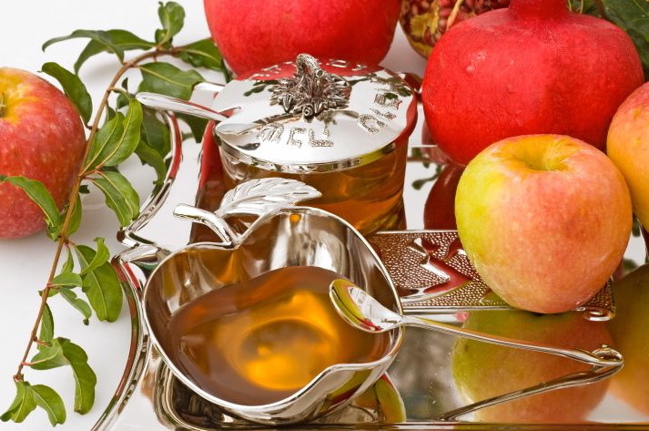
Traditional foods for a “sweet” Rosh Hashanah. (Photo by Sufeco, courtesy of Flickr)
Right now, millions of Jewish families are looking forward to the start of Rosh Hashanah. It’s a happy yet solemn time of year—an eagerly awaited opportunity for spiritual renewal and family reunions. Themes of life and death remain central reminders throughout these days, as they have for centuries. Between Rosh Hashanah and Yom Kippur, Jews take stock of their actions over the past year, ask for forgiveness to those they have wronged and vow to do better.
Tradition tells us that God ponders who shall live, or be inscribed in the Book of Life, and who shall die by the close of Yom Kippur. This year, of course, millions are pondering these sacred words in light of the United States passing more than 1 million deaths due to COVID. Worldwide, the death toll is more than 6.5 million!
Who else hears those solemn words in the service each year with high anxiety and often with broken hearts? Anyone who struggles with cancer in their own life or in the lives of loved ones.
Believe me: I have these words—these questions—leap off the page at me. I have moved from a diagnosis of stage III in 2016 to state IV metastatic colorectal cancer with “3-6 months to live” the following year —to a patient determined to beat this disease in 2018—to rebuilding my life and celebrating my survival in 2019—to becoming a national advocate for all those who continue to suffer cancer’s effects currently.
“Who shall live and who shall die?” There is more than a simple annual tally in that question. It’s a deep question each of us struggles to answer every day.
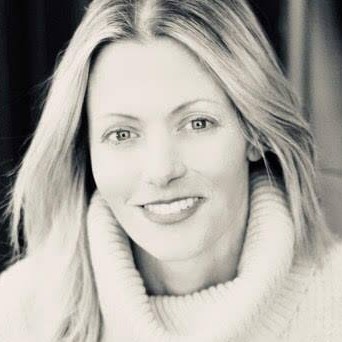
My friend Sarah DeBord.
This story is my story, but also about some friends I met along the way—like the remarkable “cancer whisperer” and activist Sarah DeBord. It’s their story as much as it is mine.
But—perhaps like your own life’s story—mine began as a surprise. I was diagnosed with stage III colon cancer after my 50th birthday in June of 2016.
My gastroenterologist was hovering over me as I was awakening from the procedure and my wife Lisa was at my side. This colonoscopy was supposed to be an unremarkable milestone—just one of those medical tests you’ve got to check off as you age.
So, I was groggy but jovial as I recognized him looming above me.
“Hi, doc! Everything is OK, right!” I wasn’t asking him. I was telling him. I was ready to pop back into the rest of my life. Like always, I just kept going: “I’m in great shape and feeling well.”
Then, I suddenly realized something was wrong in their faces. Dr. Goldmeier said, “No, Howard, everything’s not OK. I found something way up in your Cecum connecting your small and large intestines. Usually, this is bad news.” He took a biopsy and sent it to the lab. It was bad news and an 8-centimeter tumor turned into a diagnosis of stage III colorectal cancer.
My thoughts were speeding 100 miles per hour: What if the screening age had been lower!?! And, finally after years of advocacy work, it has dropped from 50 to 45. Even now I think it needs to move even lower as younger-onset colon cancer is growing. The death of Chadwick Boseman at age 43 in 2020 became a national wakeup call to younger adults.
‘Get Your Affairs in Order’
“Get your affairs in order.” I heard those unimaginable words. My life span was constricting to a 4% chance of surviving 18 months. My daughter Emily had just completed her sophomore year in high school. My wife Lisa and I had just celebrated our 23rd wedding anniversary.
I had beaten Stage IV Non-Hodgkin’s Lymphoma cancer when I was in my 20s. Then, I had started out more passive, like a deer in the headlights. This time, I set out on that long, painful journey like a Marine on a mission—assembling my support team, relying on the strength of my amazingly supportive wife, family and large social network, determined to kill cancer rather than letting it kill me. Still, to be honest, there were those agonizing questions. Would I live to see Emily graduate? To grow old with Lisa? I am living out the ancient wisdom: Nothing in life is guaranteed and our tenure on earth is a short one.
And, one autumn after another as we—as cancer patients and care partners—struggle through surgeries, procedures, chemotherapy treatments and all kinds of crazy side effects, there came those inevitable lines in the Rosh Hashanah and Yom Kippur services: Who shall live and who shall die?
In the fall of 2017, I started salvage or second-line chemotherapy called Irinotecan coupled with Avastin. With my body cooperating and God’s good graces I got some good news. I had a slight “regression” or shrinkage of the tumor set. My reward was six more cycles of chemotherapy. While doing more chemo, my wife Lisa “graduated” to the Stage IV Caregiver’s group of Colontown.org, a private Facebook support group and I joined its neighborhood group Hipec Heights through Vincent De Jong and Kim Sully (Stage IV colon cancer patient-survivors-advocates). In March of 2018 I had the mother of all surgeries: CRS/HIPEC at the Rose Cancer Center at Beaumont Hospital in Royal Oak, Michigan. The recovery was brutal and then more chemo and major side effects along the way. It took me a full year just to feel close to right again. I continue like many cancer patients and families trying to put “Humpty Dumpty” back together again and rebuild our lives.
To date, I survive. This year, when I hear those words in the annual prayers, I’m more confident for myself, because I now am NED (No Evidence of Disease at this time) after a lengthy series of periodic scans.
So, are those words less solemn for me? Less freighted with emotion? Easier to roll past me as the holidays come and go?
No. And the reason is: When coping with cancer, we learn that we cannot do this alone. We learn to lean on others, to depend on others—and eventually to reach out and let others lean on us, depend on us. And, in doing so we unwittingly sign up for a terrible toll we all know so well—the loss of fellow cancer patients.
‘Cancer whisperers’ and ‘survivors guilt’
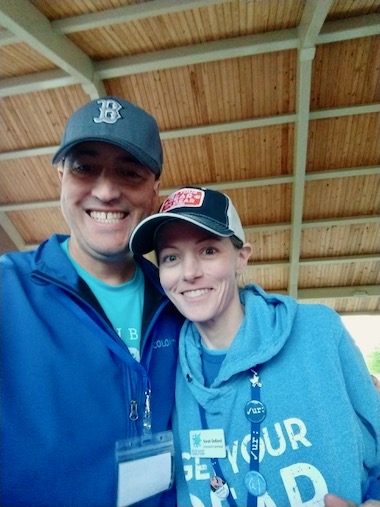
Volunteering with Sarah Debord at Get Your Rear in Gear fun run in Grand Rapids in 2019.
The question quickly becomes: Why am I alive and great people like my dear friend Sarah DeBord died after a courageous and inspirational eight-year battle with colon cancer? I did get to see Emily graduate and start college. I’m eagerly looking forward to the next milestones I will enjoy with her and Lisa. But, Sarah left behind her a devoted boyfriend and 2 precious young boys.
Sarah was “a cancer whisperer” to me and so many others. Her life had such meaning! So many people depended on Sarah; and she graciously welcomed that. I keep asking: Why did Sarah die? Why am I still here? And, yes, I understand that we call this “survivor’s guilt” and it’s common among us. But, that still doesn’t answer the questions that keep rattling around in our hearts.
I met Sarah Debord in Denver at a Colontown.org, Empowered Patient and Caregivers Conference in October of 2018. I randomly sat next to her, but I had heard of her, and had read her blog. Sarah was a social media guru, working in marketing communications for the Minneapolis-based Colon Cancer Coalition. She promoted screening, awareness and funding via the signature Get Your Rear in Gear and Tour de Tush event series. These are volunteer-driven efforts in communities throughout the United States, granting over $1 million to local community programs that will raise screening rates, increase awareness, and educate the public about the signs and symptoms of colorectal cancer.
The baseball world series was on TV and we watched “my” Boston Red Sox play “her” Los Angeles Dodgers at a restaurant that evening.
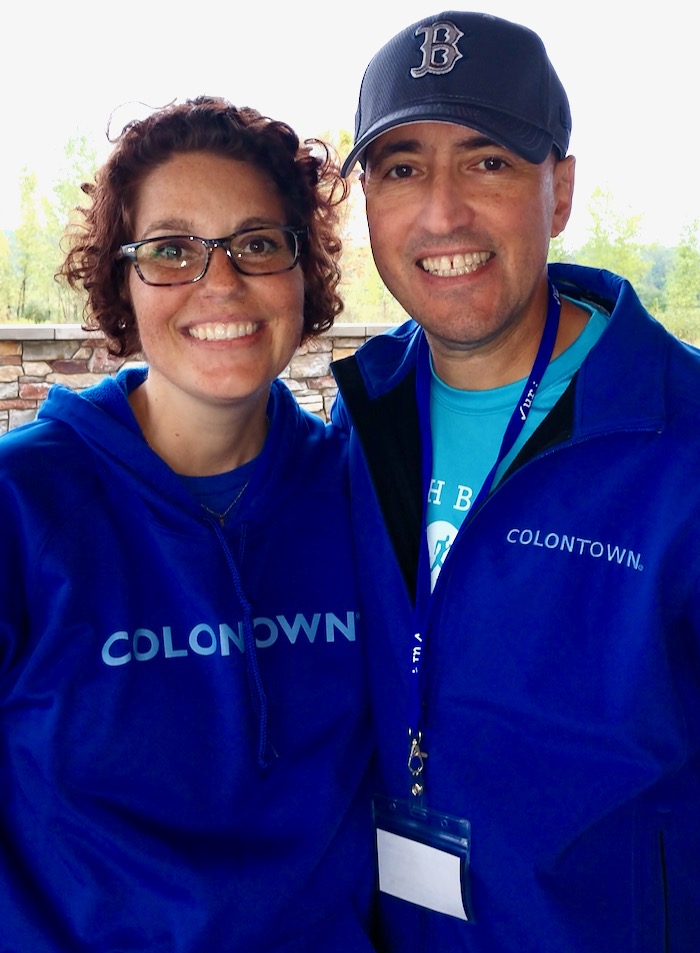
With Dr. Chelsea Boet
Violet Kuchar, who is now deceased, joined us and we spent time with Dr. Chelsea Boet and Facetimed with Stacy Hurt in Pittsburgh. This group of Stage IV women and myself formed a private group to share, support and send virtual hugs to each other as we each faced chemotherapy, surgeries, clinical trials and side effects galore. So much darkness was heaped upon our families—psychologically, financially, physically.
My next meeting with Sarah was at Get Your Rear in Gear in Grand Rapids, MI, in September 2019. Dr. Chelsea was the chair and she had her “Team Chelsea” there to support her and the event. I served as a volunteer.
Sarah was tired and frail, but at 95-pounds was tough as nails. At the end of the day I spent some quiet time that ended with a hug and some good-natured ribbing about my Red Sox’ World Series win over her Dodgers. I told her to hug her boys, she told me to hug my girls and left for the two-hour drive home not knowing that I would never see or hug Sarah again.
Death is a part of life
Who shall live and who shall die? As I think about those words this year, I’m overwhelmed with memories of Sarah and Violet. They’re gone. Meanwhile, Stacy and I are grateful for achieving NED but have much farther to go to get away from this crappy disease. Dr. Chelsea is in active treatment and still fighting her fight. It is an unfortunate fact the we see far too much death following a Stage IV metastatic cancer diagnosis.
What that ancient question in the prayers reminds me of each year, is that I do not have any say in the matter. I struggle with Violet and Sarah passing—and I may never be over it. I cry every day that I cannot instant message, text, call or social media post to them. I hope somehow that they know in heaven that they are missed so dearly, so whole heartedly by me and so many.
What that ancient question reminds all of us is: Men and women have been asking these questions—and crying these tears—for thousands of years. Death is a part of life. Death humbles all of us. And, even knowing that, death remains such a blow when it comes because we dare to love each other and help each other—especially those of us who build these daily bonds as cancer whisperers.
In this new year—Jews number it 5783—who shall live and who shall die?
I do not know. Only God knows. What I do know is that I can remember each life. I can retell the stories as I have just done. And that’s ultimately the purpose of the prayers we read and chant and sing at the High Holy Days. We can learn and grow from our challenges and the example of other cancer patients. We pass along our hard-earned wisdom. We remember. We can tell and retell the inspiring stories we share. We pray together. We hope together. We recommit ourselves to keep on loving as long as we live.
And, this year, when I hear those words twice—on Rosh Hashanah and Yom Kippur—I can say: “O God, may their names remain a blessing to those of us who knew and loved them.”
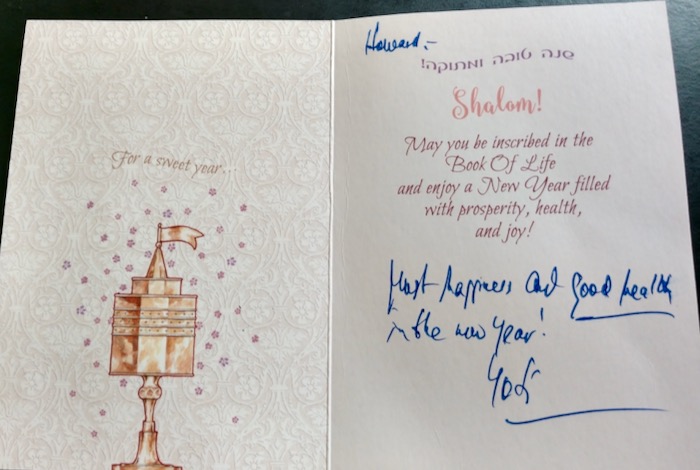
One of the Rosh Hashanah cards from friends and loved ones that I have saved. Thanks to all of my family and friends who have wished all of us—and I do mean “all of us” within our global circle of family and friends—a sweet new year.
.
.
.
 Care to learn more?
Care to learn more?
This is a perfect moment to become one of Howard’s growing global community of friends by ordering your copy of his book.
Here are other articles we have published, exploring the launch of this book:
Take a look at the book’s Foreword: ‘Shining Brightly’ Foreword by Dr. Robert J. Wicks: ‘Learn anew about the American Dream’
We ask these timeless questions at each New Year: ‘Who shall live and who shall die?’ In this moving and inspiring column, Howard Brown writes about the powerful spiritual resources in our religious traditions that can help families struggling with cancer renew their resiliency.
Download printable and shareable resource guides for discussing Shining Brightly:
- First is What are the ‘Keys to Resiliency when Confronting Cancer?’ Howard is freely sharing resources from the Discussion Guide for his new book—a page that lists 18 keys to resiliency that have proven valuable in his life and in the lives of people he has mentored through cancer.
- Second is Why should we become mentors?
.
.
.
.
